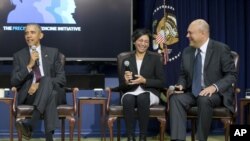Precision-based medicine could become the foundation for revolutionizing treatment of cancer, Alzheimer's and other diseases causing "pain and suffering across America," U.S. President Barack Obama said Thursday.
The president spoke during a meeting of private, non-profit and public groups at the White House, where he learned about advances in his Precision Medicine Initiative, a major project to learn how to tailor medical treatments to individuals.
The White House has said the project seeks to end the "one size fits all" approach to medicine and develop "new treatments that are designed for specific characteristics of individuals, such as a person's genetic makeup."
A more personalized approach
Obama announced the $215 million initiative in his 2015 State of the Union address.
"So often what we label as a healthcare system is actually a disease care system in which the patient is passive," the president said, noting that precision medicine allows patients to take a "more modern and active role" in their own health.
The president said that precision-based medicine is not a substitute for regular healthcare, but could help address some of the costs.
"What we're now seeing is possibility of us identifying diseases, targeting them, individualizing treatments for a particular patient, and operating with the kind of precision that promises to reduce costs, provide much better care, and make our entire healthcare system much more effective," the president said.
Exploring genetic causes of cancer
The National Institutes of Health has expanded the number of clinical trials seeking to discover the genetic causes of cancer as part of the project. The program includes an effort to recruit one million volunteers by 2019 for a nationwide research project that will study genetic and health habits to discover the genetic commonalities for diseases. The NIH aims to recruit 79,000 volunteers for the project in 2016 and has begun setting up the database for recruitment.
Obama has asked Congress for $309 million to scale up the initiative next year. In 2015, the president said he wanted "the country that eliminated polio and mapped the human genome to lead a new era of medicine."
NIH Director Francis Collins told reporters Thursday the initiative was "the largest, most ambitious research project of this sort ever undertaken.







